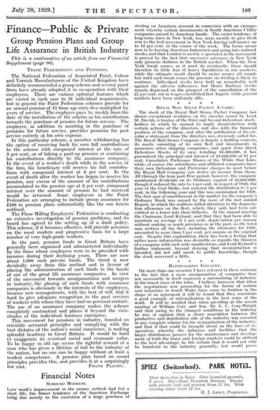=Finance—Public & Private
Group Pension Plans and Group Life Assurance in British InduStry
This is a continuation of an article from our Financial Supplement (page 96).
TRADE FEDERATIONS AND PENSIONS.
The National Federation of Associated Paint, Colour and Varnish Manufacturers of the United Kingdom hair'e definitely recommended a group scheme and several paint firms have already adopted it in co-operation with their employees. There are various optional features which are varied in each case to fit individual requirements, but in general the Paint Federation schemes provide for an annual pension of 11 from age sixty-five multiplied by years of service. The employee pays ls. weekly from the date of the installation of the scheme as his contribution towards the purchase of pension for firfure service: The employer, in addition to assisting in the purchase of pensions for future service, provides pensions for past service entirely at his own expense. In this particular scheme, a member withdrawing has the option of receiving back his own full contributions to the scheme with compound interest at the rate of 3 per cent., or of taking a paid-up pension or continuing his contributions directly to the assurance company. In the event of a worker's death while in the service of the firm, his beneficiary will receive his full contribu- tions with compound interest at 3 per cent. In the event of death • after the worker has begun to receive his pension, any excess of the amount of his contributions accumulated to the pension age at 3 per cent. compound interest over the amount of pension he had received would be returned. Some employers in the Paint Federation are arranging to include group assurance for £100 in pension plans substantially like the one herein outlined.
The Flour Milling Employers' Federation is conducting an extensive investigation of pension problems, and its board has agreed to the setting up' of a draft policy. This scheme, if it becomes effective, will provide pensions on the most modern and progressive basis for a large number of very high-grade workers.
In the past, pension funds in Great Britain have generally been organized and administered individually by the firms whose employees were to be provided with incomes during their declining years. There are now about 1,000 such private funds. The trend is now decidedly away from this method and in favour of placing the administration of such funds in the hands of one of the great life assurance companies. In view of the movement towards amalgamations and mergers in industry, the placing of such funds with assurance companies is obviously in the interests of the employees, because new managements, with the best of will, find it hard to give adequate recognition to the past services of workers with whom they have had no personal contact. The use of an assurance company makes the scheme completely contractual and places it beyond the vicis- situdes of the individual business enterprise.
This movement for pensions in industry, founded on scientific actuarial principles and complying with the best dictates of the nation's social conscience, is making splendid headway in Great Britain. It would be hard to exaggerate its eventual social and economic value. To be happy in old age seems the rightful reward of a man who has' given a lifetime of toil to the industry of the nation, but no one can be hippy without at least a modest competence. A. pension plan based on sound principles provides this, and provides it at a surprisingly
















































 Previous page
Previous page